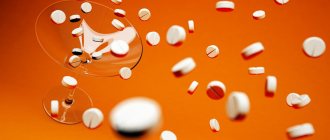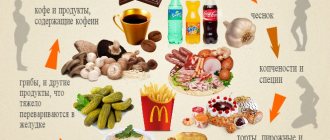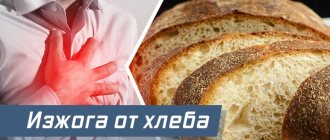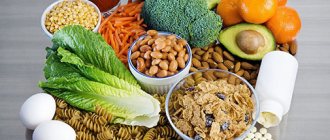How does heartburn occur?
Most often, heartburn occurs when acidic gastric juice affects the esophageal mucosa. This happens when the contents of the stomach reflux (in scientific terms, reflux) into the esophagus. The reason for such an unnatural process is incomplete closure of the sphincter (the valve that normally separates the esophagus and stomach). Aggressive gastric juice irritates the wall of the esophagus, which is manifested by a burning sensation.
Important! Heartburn can also be caused by the reflux of duodenal contents into the esophagus, which are mixed with bile and pancreatic enzymes. These are no less strong irritants for the delicate mucous membrane of the esophagus than gastric juice.
How Gaviscon® Double Action can help you
Gaviscon® Double Action works quickly2 to help relieve heartburn and indigestion. It forms a protective barrier (raft), preventing gastric juice from entering the esophagus. The drug also neutralizes excess gastric acid. Gaviscon® Double Action can last for more than four hours.3 Gaviscon® also lasts longer than antacids.4
The answer to the question “How to get rid of heartburn?” consists first of all in revising your habits. If you can change your evening habits, you will find it easier to combat the symptoms of heartburn and indigestion. However, if you still want to eat deliciously in the evening, have a drink with friends, or just have fun, always have Gaviscon® Double Action with you.
Causes of heartburn
Hiatal hernia
Normally, the esophagus passes through an opening in the diaphragm (the muscle that separates the chest and abdomen).
If it is larger than necessary, then part of the stomach protrudes through it into the chest cavity. This protrusion is called a hernia. O.A. Molodkina: “The most common complaint with a hiatal hernia is heartburn. It appears at night, after eating or exercising.”
Chronic gastritis with increased secretion
Heartburn occurs due to the fact that too much hydrochloric acid is formed in the stomach.
O.A. Molodkina: “Excessive acid secretion is provoked by the consumption of fatty, fried and spicy foods, marinades, cold dishes, rare as well as heavy meals. Heartburn in this case is combined with pain in the upper abdomen immediately after eating.”
Stomach and duodenal ulcers
A defect (ulcer) appears on the stomach lining, which prevents it from contracting normally and pushing food into the intestines. Food is retained in the stomach, it becomes greatly stretched and the pressure in it increases. All this further aggravates the reflux into the esophagus.
Achylia and achlorhydria
With these pathologies, the gastric juice does not contain hydrochloric acid and pepsin (an enzyme that breaks down eaten proteins). Heartburn occurs because lactic and butyric acids, which are formed during the fermentation of food in the stomach, are thrown into the esophagus.
Disease of the operated stomach
It occurs in people who have had part of their stomach and duodenum removed, for example due to an ulcer or tumor. In this case, heartburn is caused by digestive juice containing pancreatic enzymes and bile, which enters the esophagus.
Medicines
Important!
Aspirin and some non-steroidal anti-inflammatory drugs damage the esophagus and stomach, leading to heartburn.
O.A. Molodkina: “Nitrates, antispasmodics, sedatives, hypnotics, and tranquilizers can lead to heartburn.”
Some products
O.A. Molodkina: “Heartburn can also occur in healthy people after severe overeating, eating sweets, black bread, fresh baked goods, spicy and fatty foods, dairy products, alcohol, chocolate, black tea, coffee, sour apples or plums, lemons, tomatoes, tomatoes sauces."
Acid reflux: symptoms
Acid reflux, also known as heartburn, typically involves a burning sensation in the stomach, chest, and throat.
Other possible symptoms include:
- difficulty swallowing
- chest pain
- nausea
If the condition occurs regularly, it may indicate gastroesophageal reflux disease (GERD).
Trying to sleep
The International Foundation for Gastrointestinal Disorders (IFFGD) notes that 79% of people with GERD symptoms experience them during sleep.
75% of people with the condition say symptoms affect their sleep, and 40% say loss of sleep affects their ability to get up.
Although GERD affects sleep, sleep deprivation also affects GERD. Lack of sleep can cause the esophagus to become more sensitive to acid.
Acid reflux that occurs after sleep has more severe symptoms than daytime acid reflux.
This combination of sleep disturbances and more severe symptoms means that acid reflux affects the quality of life of people with the condition.
Heartburn medications
Gastroenterologists for heartburn prescribe the following groups of medications:
- Antacid drugs. They contain magnesium, calcium, and aluminum salts, which neutralize hydrochloric acid. Now the contents of the stomach, entering the esophagus, do not irritate its mucous membrane.
- Alginates. In the acidic environment of the stomach, alginates form a gel barrier, which reduces the amount of gastric contents reflux into the esophagus.
- Antisecretory drugs. They suppress the formation of hydrochloric acid in the stomach, and the contents thrown into the esophagus are no longer so aggressive.
- Prokinetics. These drugs cause the esophagus to contract more actively, increase the tone of the sphincter (it now well closes the opening between the esophagus and the stomach), and also accelerate the movement of food from the stomach to the intestines.
Folk remedies for heartburn
You can resort to folk remedies only if there are no medicines at hand.
There are many recipes for heartburn, but not all of them are effective. Most often used:
- Milk. It neutralizes hydrochloric acid only for a while, envelops the stomach and creates the impression that everything is fine. But after a lull, milk stimulates the formation of gastric juice, and it only gets worse.
- Soda solution.
Many people immediately drink soda when they have heartburn. Of course there will be an effect, but it will be very short-lived. When soda enters the stomach, a lot of carbon dioxide is formed, which stretches the organ and sharply increases the pressure in it. All this provokes repeated heartburn. Important! You should not regularly take soda if you have heartburn, as this disrupts the ratio of salts and water in the body (the so-called water-salt balance). - Potato. This vegetable is good for heartburn. You can chew raw potato pieces or drink freshly squeezed juice.
- Mint decoction. Mint will not help with heartburn, but will only harm. After all, it relaxes the sphincter between the esophagus and the stomach, and hydrochloric acid rushes into the esophagus even more actively.
Treatment
For GERD in general, doctors may recommend one or more treatments:
Medicines
Over-the-counter medications that reduce stomach acid levels may help relieve GERD symptoms.
An older study evaluating the effect of the proton pump inhibitor (PPI) esomeprazole found that it alleviated bedtime heartburn and related sleep disturbances.
Operation
Doctors may recommend surgery if behavior changes and medications do not improve symptoms.
Surgical options may include fundoplication. During this procedure, the surgeon connects part of the stomach to the lower esophageal sphincter.
The Society of American Gastrointestinal and Endoscopic Surgeons states that surgeons typically perform fundoplications using laparoscopy. This procedure involves making several small incisions instead of one large one.
Melatonin
Melatonin is a hormone that the body produces before sleep. It helps us fall asleep and can help prevent or relieve symptoms of GERD, including acid reflux.
IFFGD found that deep sleep tends to improve GERD symptoms. This finding led them to believe that reducing the time spent awake after bedtime could reduce these symptoms.
They then conducted a study to test the effect of the sleep aid drug ramelteon, which works similarly to melatonin.
In the study, participants who took ramelteon before bed experienced fewer GERD symptoms at night. The benefit was attributed to the improvement in sleep produced by the drug.
What's more, a 2022 study reports that melatonin reduces acid secretion in the stomach and helps the lower esophageal sphincter stay closed when needed.
Given the results of two studies, it appears that melatonin may help by improving sleep quality and reducing the effects in the body that cause acid reflux.
Preventing heartburn
To prevent heartburn from bothering you, follow some rules.
Change your lifestyle:
- do not bend over after eating;
- do not lie down immediately after eating (you need to wait 1.5-2 hours);
- sleep on two pillows;
- do not wear tight clothes, tight belts, bandages or corsets;
- do not lift heavy things;
- give up cigarettes;
- think about losing weight if you are overweight.
Change your diet:
- don't overeat;
- do not eat very hot or too cold food;
- do not overeat at night (dinner should be 3 hours before bedtime);
- try not to eat fatty, fried, pickled, spicy foods, as well as citrus fruits, onions, garlic, sour fruits and chocolate;
- try not to drink alcohol, coffee, strong tea, sour juices and fruit drinks.
Prevention
There are some changes you can make to your diet and lifestyle that can prevent GERD symptoms.
Lifestyle changes
AAAAI notes that the following lifestyle adjustments may help prevent acid reflux from occurring:
- reducing alcohol consumption
- to give up smoking
- achieving or maintaining a moderate weight
Dietary changes
Diet can also play a role in preventing acid reflux.
Foods to Avoid
IFFGD advises avoiding potential dietary triggers such as:
- chocolate
- fatty or fried foods
- carbonated drinks
- onion
- tomatoes and citrus fruits
Foods to include in your diet
IFFGD recommends a diet that includes the following foods in the diet that may help prevent or reduce acid reflux:
- fruits
- vegetables
- whole grains
- foods with healthy fats such as olives, avocados and fatty fish
- lean meat
- eggs
Heartburn at night and pregnancy
It is common for women to experience heartburn during pregnancy, even if they did not experience it often before pregnancy.
Research from 2015 shows that 17-45% of women experience heartburn during pregnancy. This can happen for many reasons, including added pressure within the body, weight gain, and changes in hormones and stress levels.
Diet and lifestyle changes can help control heartburn at night.
However, if home remedies are not effective for pregnant women, or they cannot take certain medications, they should talk to their doctor about other options.
What to do if you suffer from heartburn?
Heartburn. Where does it come from, what is its danger and what to do if it bothers you?
Vasilisa Vladimirovna Ishchenko, a gastroenterologist at the Expert Kursk Clinic, helped us understand these issues.
— Vasilisa Vladimirovna, what is heartburn and how long can an attack last?
Heartburn is a burning sensation of varying severity, rising from the epigastrium/stomach area to the neck and pharynx, along the esophagus.
It can be combined with other manifestations - such as belching sour, bitter, regurgitation of food, disturbances in the swallowing process and its pain.
Sometimes a person cannot adequately describe heartburn by talking about a feeling of pressure, fullness, warmth or a lump behind the breastbone.
HEARTBURN IS NOT ALWAYS AN INDICATOR OF DISEASE. REFLUXES (REFLUXES) OF THE CONTENTS OF THE STOMACH AS A QUITE RARE PHENOMENON ARE ENCOUNTERED IN MANY PEOPLE
The duration of the episode itself is short, but the burning sensation can persist for a long time and is difficult to eliminate with water or food.
— The “hot” feeling from heartburn is always unpleasant. When does heartburn occur? What diseases is this symptom typical for?
Heartburn can occur for various reasons. This is the consumption of low-quality food that irritates the esophageal mucosa; intake of sweets, citrus fruits, spices, carbonated drinks.
A very significant factor is an increase in intra-abdominal pressure. It promotes the reflux of gastric juice and food from the stomach into the esophagus. This can happen, in particular, when lifting weights, significant physical stress, overeating, coughing, wearing tight clothes (as well as belts, bandages), pregnancy.
Promotes heartburn and obesity.
REFLUX DISEASE IS PROPOSED TO RECURRENCE. THEREFORE YOU CANNOT LEAVE HEARTBURN WITHOUT ATTENTION
It can be caused by taking a number of medications (some drugs to lower blood pressure, treat bronchial asthma, etc.); smoking.
Read the material on the topic: What is gastritis and how to treat it?
The most common disease is gastroesophageal reflux disease (GERD). The basis of this pathology is a violation of the motor function of this anatomical region. It is characterized by repeated regular reflux of stomach contents (sometimes the duodenum) into the esophagus.
Functional heartburn is classified as a separate disease. In this case, it is an independent disease, and not a manifestation of other causes.
— Is heartburn always a symptom of some kind of gastrointestinal tract disease or can it occur in healthy people?
Heartburn is not always an indicator of illness. Reverse reflux of stomach contents is a fairly rare occurrence and occurs in many people. For example, a person ate too much and went to work in the garden. When bending forward, he may develop reflux and experience an episode of heartburn. Moreover, this occurs non-systematically; there are no complications or endoscopic signs of heartburn.
— What does heartburn threaten our gastrointestinal tract?
Development of gastroesophageal reflux disease. At the same time, erosions and ulcers can sometimes form on the esophageal mucosa, with the formation of scars. In some cases, the so-called Barrett's esophagus develops, when the cellular composition of the esophageal mucosa is replaced by other, uncharacteristic types of cells. Without treatment, esophageal cancer may develop.
Read material on the topic: Gastroscopy with comfort? Is it possible
Reflux disease is prone to relapse. Therefore, heartburn should not be ignored under any circumstances.
— How do you understand that heartburn is a sign of a gastrointestinal tract disease and it’s time to see a doctor?
By manifestations. This is pain in the esophagus, including when swallowing, difficulty swallowing. Of course, you should consult a doctor if you have anemia or weight loss. Sometimes people with heartburn are bothered by a cough, there are attacks of bronchial asthma and so-called aspiration pneumonia. These manifestations and diseases may be associated with the reflux of acidic gastric contents into the respiratory tract.
You should definitely consult a doctor if symptoms first appear after 45-50 years.
— What kind of doctor should you consult if you suffer from heartburn?
To a gastroenterologist. If it is not available, see a therapist or general practitioner.
You can make an appointment with a gastroenterologist in your city here
Please note: the service is not available in all regions
— How to find the cause that causes heartburn? What diagnosis is carried out for a patient suffering from heartburn?
Complaints are collected, a detailed history is obtained, and an examination is carried out.
To confirm and clarify the diagnosis, instrumental diagnostic methods are used. Among them: esophagogastroduodenoscopy, if indicated - biopsy (sampling) of a fragment of the esophageal mucosa; fluoroscopic examination of the stomach with contrast (barium sulfate); measurement of pH of the esophagus (pH-metry).
Read the material on the topic: How often can you take x-rays per month and year? And other questions
A general blood test is also performed, and, if necessary, an analysis for tumor markers; daily pH-metry, ECG.
Consultation with related specialists is required - ENT doctor, cardiologist, pulmonologist.
— What to do if you have an attack of heartburn? How to provide first aid?
Various groups of drugs are used. The main principle of their action is the neutralization of acidic contents from the stomach.
They are not suitable for systematic treatment, since they eliminate the problem situationally, and some of them can cause negative consequences when taken for a relatively long time.
In order to relieve an attack of heartburn, you can take one of the following drugs in the recommended single therapeutic dose: Gaviscon, Almagel, phosphalugel, Maalox. Smecta has a slightly lesser effect.
It is better to take medications after consultation with a doctor, in the absence of contraindications.
— Vasilisa Vladimirovna, medications for heartburn are not prescription, so they can be easily bought at a pharmacy and prescribed to yourself. How long can you use antacids without causing health consequences? Do heartburn medications have side effects?
They can be used for no more than 10 days.
There are side effects. This is an increase in calcium levels in the urine and magnesium and phosphorus in the blood.
WHEN USING SODA TO RELIEF SYMPTOMS OF HEARTBURN, THE CELLS OF THE STOMACH RECEIVE A SIGNAL THAT ACIDITY HAS BEEN STRONGLY DECREASED, AND BEGIN TO PRODUCE ACID EVEN MORE INTENSIVELY
They are contraindicated in case of severe disorders of the nervous system, kidneys, Alzheimer's disease, or hypersensitivity to them.
— Out of habit, many Russians use soda or chalk during an attack of heartburn. How safe is it?
Unfortunately, it's not as safe as it seems. We must remember that the same soda is an alkali. And alkalis, in addition to the fact that they can neutralize acid, can themselves have an irritating effect on the gastric mucosa.
The problem is that after “quenching” the acid to almost zero, the cells of the stomach receive a signal that the acidity has greatly decreased, and begin to produce it even more intensely. As a result, heartburn will worsen.
Therefore, these remedies should not be used.
— What is the prevention of heartburn? Is it possible to avoid the appearance of this unpleasant symptom?
The main thing in prevention is changing your lifestyle. Body weight should be normalized; Avoid significant bending of the body after eating for at least 2 hours, and do not lie down during this time. The last meal is 3 hours before going to bed. Do not use tight belts, belts, or bandages.
It is necessary to identify foods that provoke the development of heartburn, including carbonated drinks. For frequent severe heartburn, including at night, as well as for hiatal hernias, raise the head of the bed by at least 15 degrees. Just a high pillow won't help. You need to sleep on your left side.
More materials on health in our official VKontakte group
In case of treatment-resistant, severe pathology, some hiatal hernias and serious inflammation of the esophageal mucosa, the risk of developing esophageal cancer, and reluctance to take drugs that reduce the acidity of gastric juice for life, the question of antireflux surgery is raised.
Other questions:
Delete or leave? What to do if gallstones are found?
Is it possible to cleanse the liver?
How to get rid of flatulence?
For reference
Ishchenko Vasilisa Vladimirovna
Graduate of Kursk State Medical University with a degree in General Medicine in 2015.
In 2016, she completed an internship in the specialty “Therapy” and underwent professional retraining in gastroenterology.
Currently working as a gastroenterologist at Klinka Expert Kursk.
Reception is held at the address: Karl Liebknecht St., 7.
Heartburn due to sleep apnea syndrome
Obstructive sleep apnea syndrome can be associated with numerous disorders of the respiratory, cardiovascular, urinary and other systems. Among other things, it is associated with certain gastrointestinal disorders, in particular with the appearance of heartburn.
When a person with sleep apnea experiences another pause in breathing during sleep, the respiratory center continues to send signals to the muscles of the chest and diaphragm in an attempt to allow inhalation. Against the background of intense but unsuccessful attempts to inhale, significant fluctuations in intra-abdominal and intrathoracic pressure occur, which causes compression of the stomach and an increased likelihood of reflux of its contents into the upper parts of the digestive tract. When acid enters the esophagus, it causes irritation of the mucous membrane, which leads to heartburn.
If a person suffers from heartburn caused by sleep apnea (the disease can be determined by respiratory monitoring and polysomnography), the main method of treatment is not taking antacids, but correcting respiratory disorders using CPAP therapy or other methods recommended by a specialist. Eliminating episodes of apnea in this case has a much better effect on a person’s well-being than the “usual” treatment of heartburn with medications.
If you have not yet been tested for sleep apnea, evaluate yourself for signs of the disease. These are shortness of breath at night, cough, sweating during sleep, severe daytime sleepiness, frequent urination, high blood pressure, decreased potency, and heartburn. If you have anything from this list, you should contact a somnologist. You can also take an OSA test.
Patients with sleep apnea should begin treatment as quickly as possible. The disease is dangerous, it several times increases the risk of heart attack and stroke, accelerates the development of cardiovascular and other diseases, contributes to the appearance of endocrine disorders, and daytime sleepiness with OSA greatly increases the likelihood of injury or getting into an accident.
Are you worried about heartburn? It may be a sign of sleep apnea syndrome. Contact our Center and we will help you effectively! Sign up by phone.
Heartburn at night what to do? Causes
Nighttime heartburn occurs as a result of food and acid from the stomach leaking up the esophagus. Experiencing heartburn at night may mean that a person ate before going to bed.
When a person swallows food, it passes through the esophagus and enters the stomach through a band of muscle called the esophageal sphincter. The esophageal sphincter acts as a valve to the stomach, keeping food from moving back into the esophagus.
Sometimes the esophageal sphincter does not close completely, allowing acid and food to leak from the stomach up into the esophagus. When this happens, it causes a burning sensation that people call heartburn.
Heartburn at night occurs when a person goes to bed or while he is sleeping.
When someone eats, sitting or standing, gravity helps keep acid and food inside the stomach during digestion, making symptoms less likely.
However, when a person lies down, their position may make it easier for stomach contents to leak back through the esophageal sphincter.
Several other risk factors contribute to heartburn at night, including:
- dietary triggers such as spicy foods
- obesity
- high stress levels
- smoking or drinking alcohol
- consume large portions
- eating before bed








